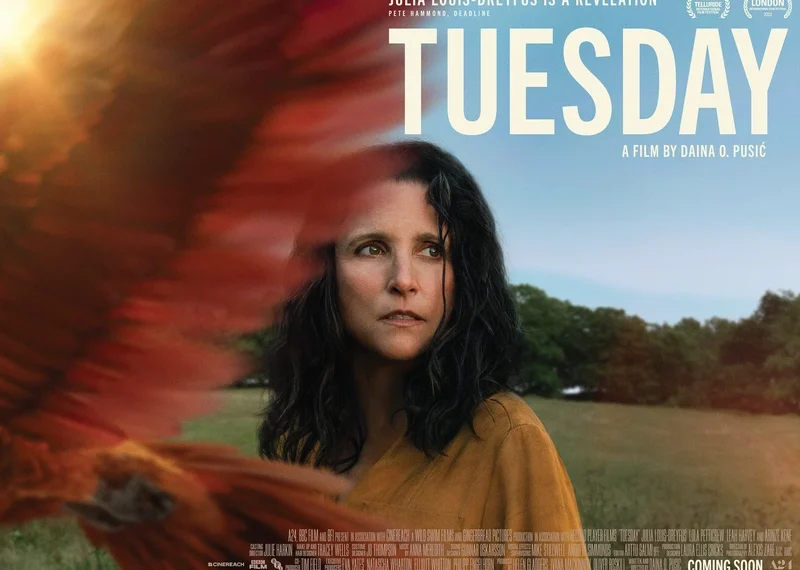Cast: Julia Louis-Dreyfus, Lola Petticrew, Leah Harvey, Arinzé Kene
Genre: Drama, Fantasy
Director: Daina O. Pusić
In Irish Cinemas: 9th August 2024
Tuesday, the debut feature from writer/director Daina O. Pusić, is challenging to despise outright. The film’s continuous deviations from conventional storytelling exhibit charm and audacity, keeping viewers intrigued through its (admittedly arduous) 111-minute duration. Among its many eccentric elements, the least absurd is a CGI macaw, representing death incarnate, significantly influencing the narrative’s trajectory. Despite these creative choices, the film suffers from a perplexing inconsistency in tone, which only occasionally finds balance through Julia Louis-Dreyfus’s praiseworthy performance. Ultimately, Tuesday’s attempts at profound commentary often appear more awkward than existential.
In the film, Louis-Dreyfus portrays Zora, an American woman living in the United Kingdom with her British-born daughter, Tuesday (played by Lola Petticrew). The narrative does not delve into the reasons for Zora’s relocation to the UK. Still, it is implied that she moved there due to her relationship with Tuesday’s father, who is no longer present in their lives. As Tuesday battles a terminal illness that causes her physical decline, Zora faces increasing medical expenses. Struggling to handle the emotional toll of her daughter’s condition, Zora distances herself from Tuesday instead of cherishing their remaining time together. She hires a home care aide, Nurse Billie (Leah Harvey), to manage Tuesday’s physical and emotional needs as Zora finds herself unable to cope. Tuesday’s illness overshadows Zora’s day-to-day life. She has secretly stopped working and is selling off her once-impressive art collection to cover their expenses. To maintain a semblance of normalcy and avoid confronting Tuesday’s deteriorating health, Zora pretends to go to work each day, leaving their quaint apartment in the morning and returning late at night. She fabricates stories about work to share with Tuesday during their bedtime routine. This delicate balance is disrupted when a shabby macaw appears in their garden one spring afternoon. The film’s opening scene reveals that this bird symbolises the Grim Reaper, guiding souls from the mortal world. When the macaw appears distressed, Tuesday offers comfort and cleans the “filthy” creature, unaware of its true nature.

In exchange for the girl’s generosity, Death agrees, in an almost inhuman purr, to delay taking her mother’s life until she returns home. After hours spent aimlessly wandering in the park, Zora finally returns, only to be met by a stony-faced Tuesday who confesses the inevitable truth of her impending demise that night. She interprets this as a result of her daughter’s frustration over her frequent absences, so Zora chastises Tuesday for her pessimism. However, when a now-miniature macaw emerges from Tuesday’s ear canal and reveals itself, the powerful emotions of a mother’s rage—and denial—are portrayed as the only forces capable of challenging Death’s grave authority. Revealing further plot details would spoil the experience for those intrigued enough to watch the film, but rest assured; this only scratches the surface of Tuesday’s commitment to absurdity. The film includes several particularly outlandish moments: intra-species marijuana smoking, a rap battle, quasi-apocalyptic events, and a scene where Zora unexpectedly consumes something vile, leading to a bizarre transformation. Although the film purports to explore the intense and varied manifestations of grief, it attempts to challenge the notion that “sadness” is the only appropriate tone for stories about death. Despite these intentions, Pusić’s film struggles with tonal inconsistency; it’s possible to incorporate humour and moments of fun in a narrative about death, but Tuesday falters when scenes intended to be sincere come across as, for lack of a better word, downright cringeworthy (such as Tuesday’s clichéd deep-breathing advice to an ancient metaphysical being).

Despite the film’s numerous flaws, Louis-Dreyfus delivers a solid performance. She stands out as the only actor who skillfully navigates the unique demands of the material, expertly delivering lines that oscillate between humour and heartache. Her capability to handle a project of such vast scope was never in doubt, but, unfortunately, none of her co-stars could match her level of performance. While Petticrew’s portrayal isn’t terrible, her frequent interactions with a CGI companion imbue her character, Tuesday, with an uncanniness that feels out of place even within the film’s overall oddity. Director Pusić intended to subvert the typical narrative of facing death, yet Tuesday ultimately falls into the clichéd trope of the virtuous terminal patient. Although the teenager occasionally lashes out, particularly at her mother, Zora, these outbursts are justified by her mother’s unconventional behaviour. The film attempts to pack in numerous fantastical elements. Still, it fails to fully develop its central characters beyond the simplistic archetypes of a “self-absorbed single mother” and a “selfless sick girl.” As a co-production between A24, BFI, and BBC Film, it’s surprising that Tuesday was such a disjointed mix of thematic interests. One would expect that these three production companies, known for supporting emerging filmmakers, would have offered more guidance to temper some of Pusić’s ambitious ideas. It raises questions about the feedback during production and whether the final product is a toned-down version of the filmmaker’s original vision. Ultimately, the responsibility likely lies more with the industry executives who approved the project than with the first-time feature filmmaker. Pusić, despite her accolades for short films, would have benefited from more constructive support in tackling a larger, more ambitious project like this. Before Tuesday’s New York premiere, the director appealed to the audience to “be gentle” with the film, citing its deeply personal origins. Unfortunately, art that relies on the kindness of its audience often struggles to stand on its own merits.
Overall: 6/10


















